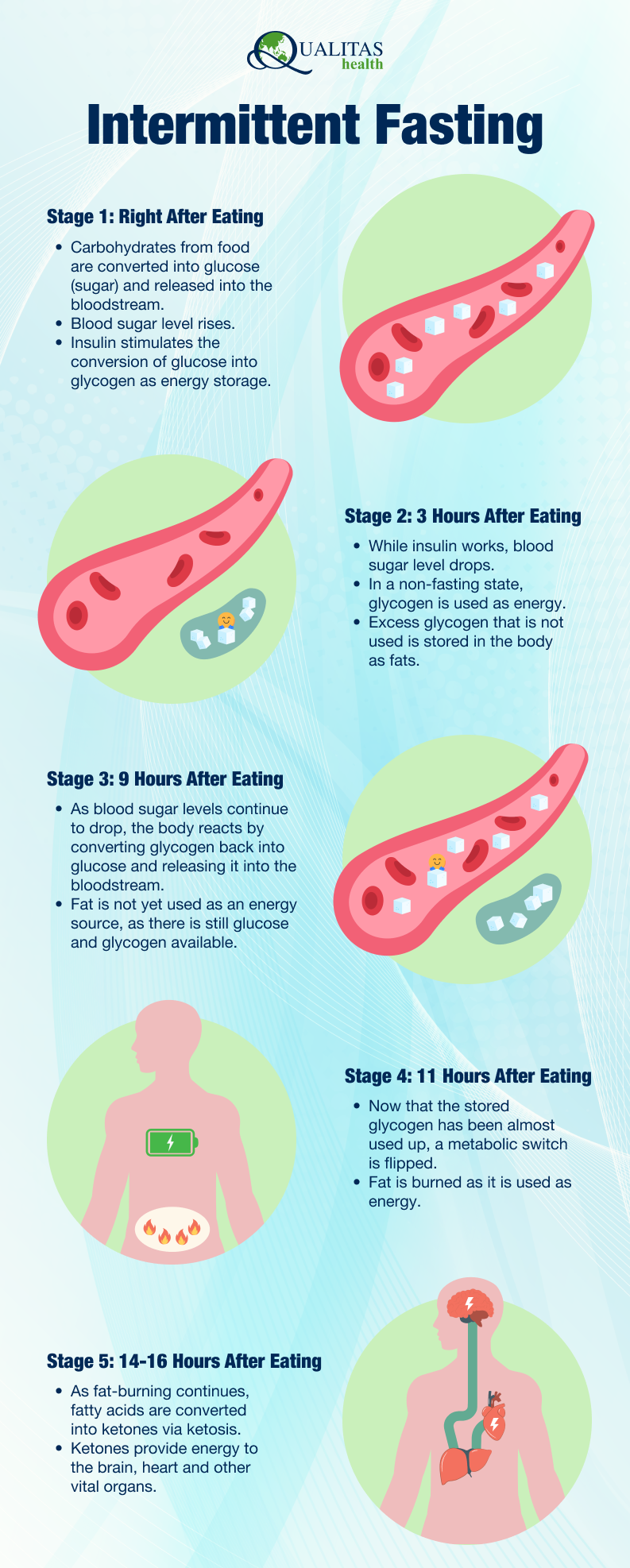
Diet fads come, diet fads go – not surprising at all when all we want is to look ‘pretty’ and feel good about ourselves. But what if there was a diet that didn’t just work superficially, but was also an effective way to lose fat, prevent certain diseases, and improve overall health?
Intermittent fasting is an eating plan that alternates between periods of eating and fasting (during which little to no calories are consumed) on a fixed schedule (ideally). Unlike most other popular diet trends, it’s less about what to eat or how much to eat and more about when to eat. This makes intermittent fasting feel less restrictive, resulting in it being more sustainable in the long run compared to other diets such as being on calorie deficit. A review by O’Neal et al. (2023) found a 79% adherence rate to intermittent fasting across 21 studies, with the majority of fasting periods being 12 weeks long.
Intermittent Fasting Plans
There’s a few different ‘schedules’ that can be followed when implementing intermittent fasting:
- The 16/8 method: This involves restricting food intake to 8 hours a day and fasting for the remaining 16 hours. Most people do this without realising by skipping breakfast and having a late lunch. However, research recommends eating during the day (e.g., 8am – 4pm or 10am – 6pm) and fasting before bed for the best effects, as metabolism follows a circadian rhythm.
- The 5:2 diet: This involves fasting for 2 non-consecutive days a week. Fasting periods involve either no calorie intake or limiting yourself to consuming less than 25% of your usual calorie intake, which is typically 500 calories for women and 600 calories for men.
- Alternate day fasting: This involves fasting every other day and eating without much restriction on non-fasting days. Fasting can be done a few ways, such as by having a zero-calorie intake, not having solid foods, or by limiting food intake to 500-600 calories.
How Intermittent Fasting Aids Fat Loss

Intermittent fasting promotes fat burning and metabolic efficiency through ketosis. Instead of glucose, stored fat is used as fuel for the body, which leads to fat loss.
Ketones reduce inflammation and oxidative stress in the brain, heart and other vital organs, which helps prevent/treat related chronic illnesses such as heart disease and Alzheimer’s. Ketosis via intermittent fasting has also been found to increase adiponectin levels, a game changer when it comes to fat loss. Adiponectin increases fat metabolism, further improving your body’s ability to lose fat fast. Increased adiponectin also reduces blood glucose levels and improves insulin sensitivity, appetite control, central fat distribution (smaller waist size) as well as muscle regeneration, thus acting as a protective factor to prevent loss of muscle mass.
Studies on alternate day fasting and 5:2 fasting (ranging from periods of 2-6 months) have reported weight loss ranging from 3-10kgs, with decreased fat mass ranging from 4-10%. Thus, intermittent fasting is not only effective for weight loss but is also ideal for people who are looking to change their body composition to be leaner and more toned.
Intermittent Fasting Helps Prevent Chronic Diseases
- Type 2 Diabetes
With constant food intake, your body’s insulin production goes into overdrive, resulting in insulin resistance and increased blood glucose levels. Intermittent fasting has been found to reverse insulin resistance in individuals with prediabetes and type 2 diabetes. In a case study by Furmli et al. (2018) at an Intensive Dietary Management clinic in Toronto, copyright, on 3 patients with insulin-dependent type 2 diabetes, all three patients were able to stop insulin therapy within one month of intermittent fasting. Additionally, they were also able to lose significant amounts of body weight, reduce their waist circumference and also reduce their glycated haemoglobin level.
- Cardiovascular Diseases
Intermittent fasting helps prevent heart disease by reducing blood pressure, heart rate, cholesterol (HDL and LDL), blood sugar and triglycerides levels. It also helps prevent atherosclerosis by preventing plaque build-up in the arteries via the reduction of inflammation markers. However, research shows that intermittent fasting methods that involve skipping breakfast may increase stress (cortisol) levels, thus increasing the risk of cardiovascular disease. So, consult your doctor before starting intermittent fasting.
- Cancer
While there are currently no direct effects of intermittent fasting on cancer, downstream results of intermittent fasting such as decreased body fat and reduced inflammation has been suggested to curb the development and progression of cancer. In animal studies, fasting has been found to suppress the growth of tumours and improve the effects of chemotherapy and irradiation.
- Brain Health & Neurodegenerative Diseases
Intermittent fasting promotes the production of ketones which increase the expression of BDNF (Brain-Derived Neurotrophic Factor). BDNF improves synaptic function, learning, memory, and neuronal survival, keeping our brain healthy and functioning optimally. Additionally, it reduces neuroinflammation, which decreases the risk of developing Parkinson’s disease and dementia (e.g., Alzheimer’s disease).

“So as long as I fast accordingly I can eat whatever I want to and intermittent fasting will work, right?”
Well, it depends.
If you’re mainly looking to reduce body fat, improve insulin sensitivity and enhance overall health, then all you really need to be on top of is following your fasting schedule. But if weight loss is on your agenda, you need to make sure that you’re in a calorie deficit. While it’s relatively easier to be in a caloric deficit when fasting, false assumptions that intermittent fasting alone results in weight loss may lead to overconsumption during non-fasting periods, and hence unsatisfactory outcomes. To further improve the effects of intermittent fasting on your physique, implement a protein-rich diet and incorporate resistance training to prevent lean body mass loss.
Should you start intermittent fasting?
Intermittent fasting is not a requirement for healthy living, it is simply one method of healthy living that can be implemented if you wish to do so. If fat loss/body recomposition and reducing the risk of type 2 diabetes are your primary health goals, intermittent fasting may be a good option for you. For further information, do consult our GPs at your nearest Qualitas clinic.
However, it is important to note that there are certain groups of people who SHOULD NOT attempt intermittent fasting without close medical supervision:
- Individuals who are on medication or suffer from chronic diseases such as diabetes mellitus, hypertension, cardiovascular disease (previous heart attack, stroke, peripheral vascular diseases), cancers, etc.
- Individuals who have normal BMI or are considered underweight.
- Individuals with hypoglyceamia (low blood glucose levels).
- Individuals who are pregnant or breastfeeding.
- Children.
References
- Albosta, M., & Bakke, J. (2021). Intermittent fasting: is there a role in the treatment of diabetes? A review of the literature and guide for primary care physicians. Clinical Diabetes and Endocrinology, 7(3). https://doi.org/10.1186/s40842-020-00116-1
- Brocchi, A., Rebelos, E., Dardano, A., Mantuano, M., & Daniele, G. (2022). Effects of Intermittent Fasting on Brain Metabolism. Nutrients, 14(6), 1275. https://doi.org/10.3390/nu14061275
- Cho, Y., Hong, N., Kim, K.-W., Cho, S. J., Lee, M., Lee, Y.-H., Lee, Y.-H., Kang, E. S., Cha, B.-S., & Lee, B.-W. (2019). The Effectiveness of Intermittent Fasting to Reduce Body Mass Index and Glucose Metabolism: A Systematic Review and Meta-Analysis. Journal of Clinical Medicine, 8(10), 1645. https://doi.org/10.3390/jcm8101645
- de Cabo, R., & Mattson, M. P. (2019). Effects of Intermittent Fasting on Health, Aging, and Disease. New England Journal of Medicine, 381(26), 2541–2551. https://doi.org/10.1056/nejmra1905136
- Furmli, S., Elmasry, R., Ramos, M., & Fung, J. (2018). Therapeutic use of intermittent fasting for people with type 2 diabetes as an alternative to insulin. BMJ Case Reports, bcr-2017-221854. https://doi.org/10.1136/bcr-2017-221854
- Krause, M., Milne, K., & Hawke, T. (2019). Adiponectin—Consideration for its Role in Skeletal Muscle Health. International Journal of Molecular Sciences, 20(7), 1528. https://doi.org/10.3390/ijms20071528
- Mattson, M. P., Longo, V. D., & Harvie, M. (2017). Impact of intermittent fasting on health and disease processes. Ageing Research Reviews, 39(1), 46–58. https://doi.org/10.1016/j.arr.2016.10.005
- Morales-Suarez-Varela, M., Collado Sánchez, E., Peraita-Costa, I., Llopis-Morales, A., & Soriano, J. M. (2021). Intermittent Fasting and the Possible Benefits in Obesity, Diabetes, and Multiple Sclerosis: A Systematic Review of Randomized Clinical Trials. Nutrients, 13(9), 3179. https://doi.org/10.3390/nu13093179
- O’Neal, M. A., Gutierrez, N. R., Laing, K. L., Manoogian, E. N. C., & Panda, S. (2023). Barriers to adherence in time-restricted eating clinical trials: An early preliminary review. Frontiers in Nutrition, 9. https://doi.org/10.3389/fnut.2022.1075744
Comments on “Intermittent Fasting: How Does It Work?”